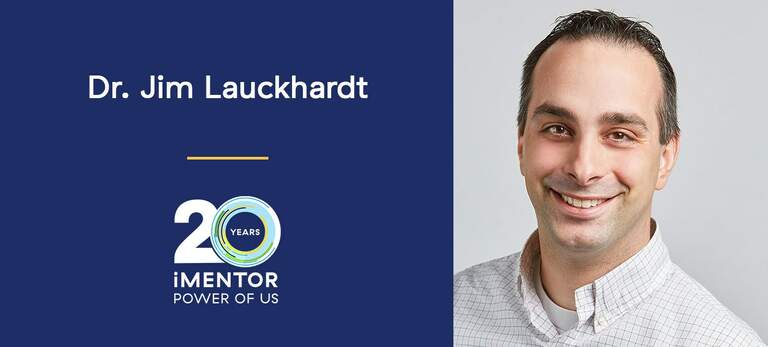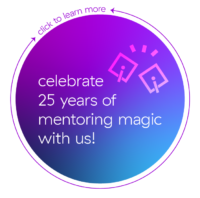During his 7-year tenure at iMentor, Jim Lauckhardt, PhD, has led the charge to develop iMentor’s robust Research & Evaluation and Organizational Learning functions, which inform every aspect of iMentor’s work. We asked him to take a moment to share what he’s learned along the way.
Jim, you’ve been at iMentor since 2013! Tell us what were you initially hired to do, and what first drew you to iMentor?
I was hired to create a strategy and vision for the Research & Evaluation (R&E) function at iMentor. Before I got here, iMentor was already tracking data, but without a broader strategic framework to use as a roadmap when identifying measurement and evaluation processes. It was an exciting opportunity to work within an organization that already had high quality programming and was ready to take its R&E function to the next level.
It was also exciting for me personally because I was coming from a series of stints as an external evaluator for a variety of Kindergarten through Higher Education programs, and while that work was tremendously rewarding, I wanted to see if getting closer to the day-to-day work of an organization would allow for more opportunities to use data to drive decision making.
As you look at the landscape iMentor works in, where do you think it stands, with respect to using data to measure results?
In my experience, it isn’t always the case that nonprofits really value and leverage their Research & Evaluation efforts, and I’m grateful that iMentor absolutely does. When it comes to this work, I think iMentor is very well positioned in both the college access and success spaces, as well as the mentoring space. We have a robust infrastructure, and a fantastic team that works hard to ensure we’re measuring the right things, communicating what we’re finding both internally and externally, and providing a sense of how iMentor is having an impact on students.
How has iMentor evolved over the last seven years, with respect to Research & Evaluation?
When I started, I had a very clear vision for how R&E work was supposed to happen, and I could be close-minded about that approach being “right”. Over time, I've learned that there is always a unique organizational context to consider when conducting measurement and evaluation work. iMentor's R&E team does not operate in isolation, and I’m proud of the team for continuously evolving toward doing the highest quality applied research and evaluation work possible.
We have also expanded our team’s ability to share insights beyond programming, to inform other aspects of iMentor’s work. As part of the team’s evolution into ‘Organizational Learning and Impact’, we’ve been able to apply our skillsets to support the measurement of organization-wide progress on strategic priorities like Diversity, Equity & Inclusion, culture indicators, and what it means to be a learning organization.
When you look back at your role in R&E at iMentor, what are you most proud of?
I’m proud that the work of iMentor’s R&E team is seen as an asset and compliment to supporting our students—as opposed to a barrier—and that it’s relevant to supporting staff members in a variety of different functions throughout the organization. I also think we've developed a clear understanding of not just the outcomes of our program, but how the inputs of our program lead to the outcomes we hope to achieve. While there is so much more ahead for what the Research & Evaluation team at iMentor can accomplish, I’m proud that this important foundation is in place.
You have been leading ‘Organizational Learning’ at iMentor. What have you learned during your time here?
I know it is such a cliché but the fact that change takes time, serious time, was something I never fully appreciated in my previous roles. Before iMentor, I could go in, conduct a study and leave, and never really consider the inner workings of the organization, what they were trying to create, how they were trying to improve, and the system within which they were trying to do those things.
I’m so appreciative to have been repeatedly humbled by the need to be patient and persistent in working on something that has been described by Jim Collins in the book Good to Great as the flywheel: There is no single defining action, no grand program, no one killer innovation, no solitary lucky break, no miracle moment. Rather, the process resembles relentlessly pushing a giant, heavy flywheel, turn upon turn, building momentum until a point of breakthrough, and beyond.
This resonates with me because, by nature, I’m a person who likes immediate and visible results. What I’ve learned at iMentor is that for true, sustainable, and important change to happen, the day-to-day work needs to be connected to the long-term vision. While it can be difficult to see the change in the short-term, it is absolutely worth “turning the flywheel” in service of long-term and important change.
Related question: How have you grown personally during your seven years at iMentor?
The people I've interacted with at iMentor have deeply influenced my personal and professional growth, something I’ll be forever grateful for. From the unique perspectives and skillsets of the people on the R&E Team making it what it is today, to the brilliance and thoughtfulness of other teams about the R&E Team’s work, I am indebted to so many people for how they’ve significantly (p<.05 for all my nerd friends) made me a better person and professional.
Where do you see iMentor going next in its Research & Evaluation, and Organizational Learning initiatives? What will be important moving forward?
I have been unbelievably lucky to hire and develop a talented group of individuals who will continue this work. I see them holding steadfast to our core value of ensuring iMentor’s work is effective for the students we serve. iMentor is so well poised to continue to do great things, and I’m excited to see more applications of learning to inform this important work.

